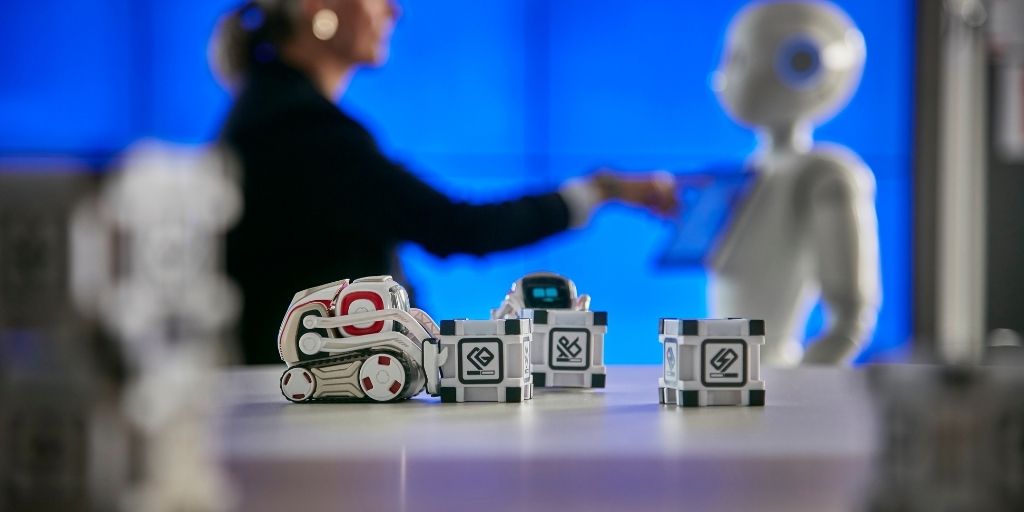
Doors of the UK’s National Robotarium to open in Edinburgh in 2022
Construction has started on a world-leading research facility for robotics and artificial intelligence, which will be the largest and most advanced of its type in the UK.
Based at Heriot-Watt University’s Edinburgh campus, the National Robotarium is supported by £21 million from the UK Government, and £1.4 million from the Scottish Government as part of the Edinburgh and South East Scotland City Region Deal.
The National Robotarium will be a centre of excellence for pioneering research and is expected to open in Spring 2022. It will create innovative solutions to global challenges using cutting-edge research, product design and industry collaboration. Bringing together academics and global companies, the facility will provide a catalyst for entrepreneurship and is expected to deliver sustainable economic benefit to Edinburgh, the UK and beyond.
Although research projects led by the National Robotarium have already begun, the new building will provide extensive world-class facilities for researchers and knowledge exchange. Key areas of research application will include hazardous environments, offshore energy, manufacturing, healthcare, human-robot interaction, assisted living and agritech.
Professor Helen Hastie and Professor Yvan Petillot are joint academic leads of the National Robotarium. Describing the vision for the new facility, Professor Hastie said: “As a world-leading facility that will promote entrepreneurship and drive forward early-stage product development, the National Robotarium will play a significant role in supporting the UK’s economic recovery from the COVID-19 pandemic.
“By drawing upon the world-class talent of the staff at Heriot-Watt and our collaborative partner, the University of Edinburgh, alongside students at the Centre for Doctoral Training in Robotics and Autonomous Systems, the National Robotarium will form a centre of excellence for fundamental research and knowledge exchange to address real-world challenges and industry needs.
“The new building will facilitate a collaborative approach that is at the heart of the National Robotarium’s ethos, helping to accelerate research from laboratory to market and paving the way for the UK to take a leadership role in AI and robotics technology.”
Professor Yvan Petillot added: “The cutting-edge resources provided by the new facility combined with the expertise of our researchers will put us in a highly competitive position to elevate the UK onto the global stage in robotics and AI technologies. Our existing and new students will have the opportunity to apply their knowledge by working on real-world problems through internships and industry-led group projects facilitated by the Robotarium, accelerating their skills as they actively shape the future of the field.
“We hope to inspire subsequent generations about the positive impact of robotics and artificial intelligence, building trust, ethics and understanding into our research outputs and engaging the public regularly through school visits and open days.”
UK Government Minister for Scotland Iain Stewart said: “The creation of the UK’s first National Robotarium in Edinburgh will place Scotland at the forefront of a technological revolution that is changing the way we work.
“This exciting new facility, supported by £21 million from the UK Government, will create opportunities for Scotland’s entrepreneurs and innovators, and bring jobs and prosperity to the entire region.
“The UK Government has now committed more than £1.5 billion to City Region and Growth Deals which will help communities to build back better from the pandemic.”
Funded as part of the Edinburgh and South East Scotland City Region Deal, the National Robotarium is a collaboration between Heriot-Watt University and the University of Edinburgh. The 40,000ft ² building will house three distinct research and development areas, providing bespoke facilities for Robotics & Autonomous Systems (RAS), Human & Robotics Interaction (HRI) and High Precision Manufacturing. Amongst the specialist equipment will be dedicated laser labs, an autonomous systems laboratory, and a living lab for trialling technology in a realistic home setting.
In keeping with the National Robotarium’s commitment to foster a responsible and collaborative approach, the building will include a ‘partner suite’ dedicated to industry, academic and government collaboration.
Innovative design means the cutting-edge resources will be matched by the building itself, with a focus on sustainability and energy efficiency. In winter, the intelligent façade will provide solar heat and recycle warm air. An ecological zone will integrate sustainable urban drainage systems, while a solar PV array will be installed on the roof. EV charging spaces will also be available. To support the facility’s commitment to public engagement activities, linear grazing luminaire technology and an exterior projector will project graphics onto the façade.
The National Robotarium will be home to numerous research projects aimed at addressing a wide range of global challenges. Examples of projects include SPRING (Socially Pertinent Robots in Gerontological Healthcare), developing the world’s first multi-user conversational robot for healthcare, intended to support the care of elderly patients and the EPSRC ORCA Hub (Offshore Robotics for Certification of Assets), a national hub of five universities led by Heriot-Watt that is advancing technologies to remove humans from hazardous work environments. The building’s assisted living lab will utilise technology to help individuals live independently for longer, with research ranging from robotics and conversational assistants to IoT devices and wireless monitoring techniques.
As part of the UKRI Trustworthy Autonomous Systems (TAS) programme, in November 2020 it was announced that the National Robotarium will spearhead research into ways to manage trust between humans and autonomous systems to support adoption in scenarios that require human interaction, such as in self-driving cars or autonomous wheelchairs.
Robertson Construction, the project’s main contractor, has been working in partnership with the University to safely start work on the building despite lockdown restrictions. David Cairns, managing director, Robertson Construction Central East said: “The National Robotarium building is designed to be as innovative as the research taking place within its walls. The commitment to sustainability and the wellbeing of its staff and students mean the facility will be equipped with state-of-the-art technology for energy efficiency and production and will boast considerable green space.
“The building will be certified to ‘Fitwel’ standards, meaning its design meets strict criteria for supporting occupants’ health, wellbeing and productivity. The start on site marks a significant moment in the delivery of a facility which will be a centre of excellence to pioneering research, we are proud to be the University’s delivery partner of choice.”
The National Robotarium forms part of the City Deal’s Data Driven Innovation (DDI) theme which aims to establish the region as the data capital of Europe.










